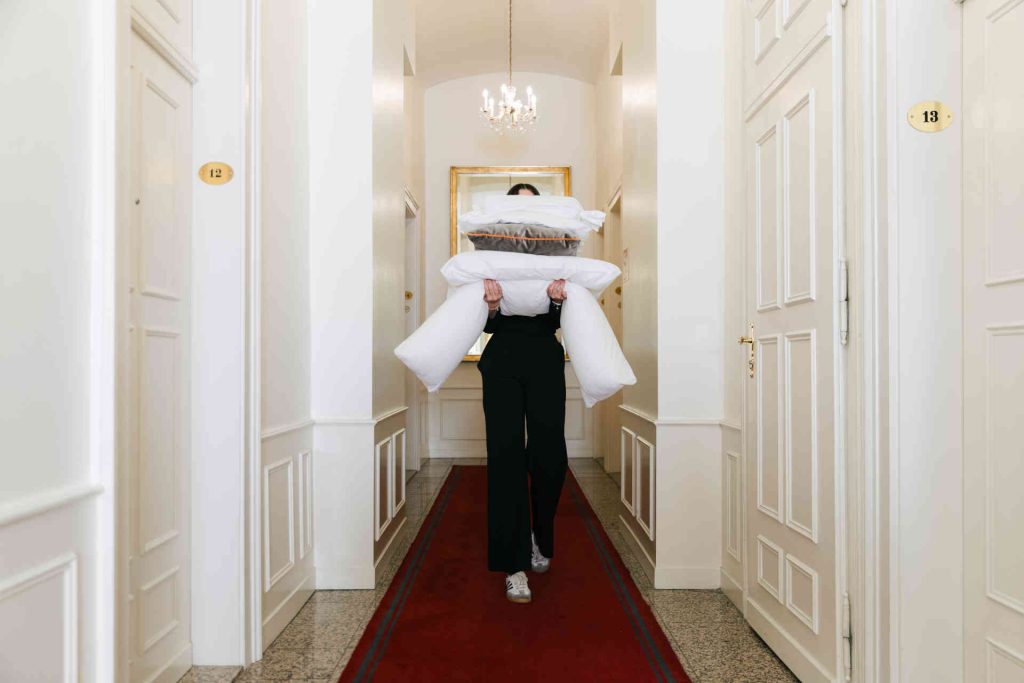
From soap in a paper bag to protecting the marine environment: sustainability in the hotel industry is no longer just about organic certificates or reusable drinking straws. Rather, it is clever ideas that are suitable for everyday use, innovative products and genuine commitment that make the difference. This article brings together inspiring examples from the field – and shows how sustainability can become a tangible attitude.
Anyone staying at the Kaiserhof Hotel in Vienna quickly realizes that they think beyond wasting resources. A simple but effective idea: there is a small paper bag in the bathroom with the inscription “Take your soap with you!” - an invitation to reuse instead of a throwaway mentality. Even smarter: those who forgo daily room service and fresh towels receive a 10% discount at the bar. Sustainability that is rewarded and saves resources at the same time.
Save water, protect water bodies, reduce CO2 - the Smartpower Clean line from Ecolab shows how next-generation cleaning solutions work. The new dishwashing products are 100% free of chlorine, EDTA, phosphate and phosphonate and carry the Nordic Swan ecolabel. Thanks to their block form and smart dosing, they reduce packaging waste by up to 95% and cut CO2 emissions during transportation by 70%. The result: brilliant wash results - sustainable and economical at the same time.
With its fully automatic coffee machines, Jura focuses on longevity instead of planned wear and tear. The machines can be cleaned and maintained at the touch of a button - without any manual unscrewing. At the heart of the sustainability concept is the new Claris water filter made from 100% bio-based plastic. Produced from tall oil, a by-product of wood processing, its life cycle begins with a negative CO2 balance. This makes sustainability a matter of course in everyday life.
The Vietnamese resort Six Senses Con Dao impressively demonstrates how deeply sustainability can go. With the “Let's Get Cracking” hatchery, the resort protects endangered sea turtles, supervises nesting and rearing phases and enables regular releases into the wild. Over 29,000 baby turtles have been released since 2018. The project is not only a successful model for species conservation, but also an emotional educational experience for guests - including “Turtle Talks” and live hatchlings.
As an official partner of the WWF, Novotel is committed to consistent marine protection. As part of the Sustainable Seafood Principles, 350 endangered fish species are excluded and fish and seafood are only purchased from certified sources. A global “Plant Forward” initiative is running in parallel, with the aim of making at least 25% of all menus plant-based by 2026. Interactive games for children, educational formats for employees and specific conservation projects in the Mediterranean region make the strategy tangible - and ecologically effective.
Whether in the hotel industry, housekeeping or the kitchen - if you want to take responsibility for the planet, you don't have to stop at the vision. It is the concrete details that inspire guests, improve processes and bring about real change. The future is green - and it starts with the next stay, the next coffee, the next touch in the hotel room.

There is a tension between digital progress and emotional hospitality that is redefining the restaurant industry. AI, automation, and data-based processes are changing not only workflows, but also attitudes, communication, and expectations. What was once considered a gimmick is now becoming a strategic necessity. And perhaps the most important question of our time: How can humans remain relevant in a world that is becoming increasingly digital?
The Austrian brand Kumanu shows how circular thinking can be applied in everyday life—and makes doing without plastic both practical and aesthetic. With its “Frischefritz” beeswax wraps and ‘Krümelkarl’ and “Pausenpaul” bread and snack bags, it provides the industry with a well-thought-out solution for keeping food fresh for longer – without any plastic or aluminum foil.
The products are made from GOTS-certified organic cotton, organic beeswax from Austria and Germany, and tree resin from traditional pitch production – a combination that has an antibacterial effect and guarantees natural durability.
Leonardo Hotels is expanding its commitment and turning World Cleanup Day 2025 into a European movement: Employees from 140 hotels in 12 countries are participating in cleanup campaigns – from Berlin to Bucharest, from London to Rome. Instead of a single day, the period has been extended to ten days to allow as many teams as possible to participate.


From soap in a paper bag to protecting the marine environment: sustainability in the hotel industry is no longer just about organic certificates or reusable drinking straws. Rather, it is clever ideas that are suitable for everyday use, innovative products and genuine commitment that make the difference. This article brings together inspiring examples from the field – and shows how sustainability can become a tangible attitude.